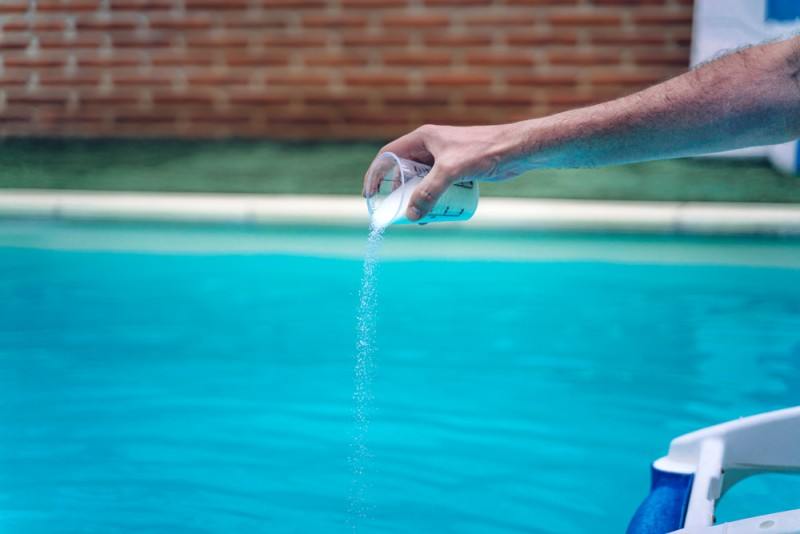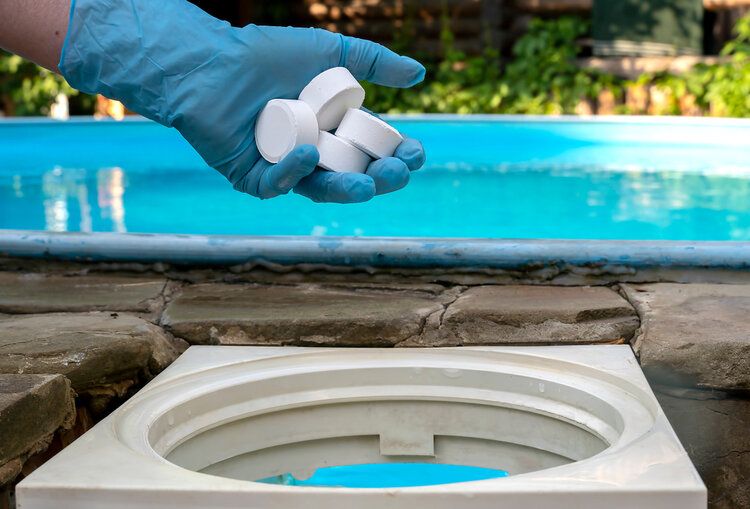Bleach vs Chlorine For Your Pool: What’s the Difference?
-
Pete Ortiz
- Last updated:

The pool is running low on chlorine again, and it feels like you just purchased a bucket of it last week.
It’s the summer; it is burning off quicker than you would like, and the cost just keeps adding up. You have heard that pool chlorine and bleach are virtually the same thing, so does it make sense to switch. What are the differences? Is it safe to use bleach instead?
These are all common and relevant questions that we will do our best to clear up for you.
What Is Bleach?

Bleach and chlorine are made of almost essentially the same things. The main ingredient is calcium hypochlorite. Bleach contains about 5.25% chlorine per gallon; the rest is water and a little bit of salt that helps the chlorine stay in a liquid form.
What Is Pool Chlorine?

Chlorine is also made up of calcium hypochlorite but in a much higher dose. The strength for chlorine is closer to 65% compared to the 5% in bleach. Some pool chlorine may also contain a stabilizer where bleach will not.
How Are Bleach and Pool Chlorine Different?
The main difference between bleach and chlorine is their strength. Chlorine is much stronger than bleach. To get your pools chlorine level to the point it needs to be to keep the pool looking clean and bright; you will need to use more bleach than you will chlorine. Bleach is also going to come in a liquid form only, and chlorine is most commonly sold in tablets.
Which Costs More?
Chlorine costs quite a bit more than bleach. The cost of chlorine can get very high in the course of a summer, which is the reason most people are reading this comparison. Although you will need to purchase extra bleach to make up for its relative strength, you will still spend less than you do on chlorine.
What Are the Disadvantages of Using Bleach?
Some pool owners are left questioning why they wouldn’t just switch over to bleach considering the cost and its availability at many local stores. To be completely honest, there aren’t too many disadvantages.
- Bleach does not contain a stabilizer. If you have been using chlorine with a stabilizer, chances are your chlorine holds up a bit longer because of it. When you switch to bleach, which is not as strong, and have no stabilizer to support it, you may be putting in quite a bit.
- Bleach can splash when poured in, so you must be careful as to what you are wearing when completing this task. Liquid bleach will turn most fabrics white almost immediately on contact. Based on your pool size, you may be putting in several gallons of bleach at a time.
- Some pool professionals will tell you not to use bleach because it can stain your liner. The truth is that over time, the chlorine will make your liner lose color. If that chlorine comes from liquid bleach or chlorine tablets, the result is the same. When pouring bleach in the pool, just be sure to walk around with it, so it is distributed evenly.
What Are the Advantages Of Using Bleach?
- Easy to access at local stores, do not need to go to a specific pool supply store
- Do not need to mix the bleach before pouring it into the pool
- The overall cost will be considerably lower
Should I Make the Switch?
If you have considered all of the factors that go into this decision and think that switching over to bleach makes more sense for you and your pool, go for it. We can’t honestly say that one option is better than another. The ingredients are almost the same, and even though you need more bleach, you will save money in the long run.
One thing to consider before switching any pool maintenance regimens is the number of issues you have been having in your pool. If you have been using chlorine for years and aside from the cost being annoying, you have never had any issues with algae or bacteria in your pool; it may not make sense to change. If, however, you are continually struggling to find the right balance changing something up may be worth it.
In Conclusion
We have said this before, and we have no problem repeating it: the most important thing to consider when it comes to pool maintenance is to always be checking your levels. Regardless of whether you decide bleach or chlorine is the better option for you, checking the levels to make sure they are within range is of the utmost importance. If you choose to switch to bleach from chlorine, make sure you know exactly how much you should be using for the size of your pool.
Featured Image Credit: Cavan-Images, Shutterstock
Contents


